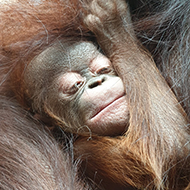
Keepers left stunned after pregnancy went undetected
A Bornean orangutan at Chester Zoo has given birth to a baby just months after returning multiple negative pregnancy tests.
Keepers say that the new arrival is ‘bright and alert’, is suckling well and has been developing as expected over the past few months. Mother Leia is incredibly protective of the infant and has kept it mostly hidden from staff since its birth in June.
Bornean orangutans are listed as critically endangered in the wild by the International Union for the Conservation of Nature (IUCN), with only around 55,000 remaining on the Indonesian island.
The new arrival at Chester Zoo was born as part of an international breeding programme which is working to conserve the species.
Chris Yarwood, a primate keeper at the zoo, said: “The pregnancy tests we had carried out on Leia in the months prior to the birth had actually returned negative results. It was therefore a wonderful surprise to arrive one morning to see her protectively cradling a beautiful new arrival.
“Leia enjoys spending lots of time alone with her baby and has so far been quite shy about showing it off. She always keeps it really close to her and so we’ve not yet been able to clearly determine what the gender of the infant is. This is Leia’s second baby – she’s a great mum and is doing a fab job once again.”
Mr Yarwood explained that Chester Zoo cares for both Sumatran and Bornean orangutans, and that babies from both sub-species have been born in recent years.
“It just goes to show that, despite all of the uncertainty in the world right now, life is carrying on as normal for the orangutans, which is really uplifting to see.”
Images (c) Chester Zoo.



 The Veterinary Medicines Directorate (VMD) is inviting applications from veterinary students to attend a one-week extramural studies (EMS) placement in July 2026.
The Veterinary Medicines Directorate (VMD) is inviting applications from veterinary students to attend a one-week extramural studies (EMS) placement in July 2026.